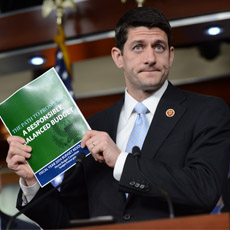Rep. Paul Ryan (R-WI) and Sen. Patty Murray (D-WA) met Wednesday to discuss budget negotiations. The architects of the House and Senate budgets had a “constructive discussion” and are “working to find common ground,” according to a joint statement. Medicare funding is one major roadblock to an agreement.
Before Ryan and Murray can convene a committee to create a joint Congressional budget, the Senate must officially send a version of its approved budget to the House. The Senate Budget Committee might wait on this until Ryan and Murray have determined who will sit on the conference committee, according to Roll Call. Once it is formed, the committee will try to reconcile two starkly different budgets.
The White House budget, released yesterday, staked out the middle ground in the budget battle, in part by including larger Medicare cuts than the Senate Democrats’ budget. Long-term care groups sharply criticized these cuts, which would reduce payments to providers by $81 billion over 10 years.
Some reductions would be achieved by equalizing payments across care settings. For example, inpatient rehabilitation facilities are reimbursed at a higher rate than skilled nursing facilities for patients with certain knee and hip conditions. Aligning these payments would save the Medicare program $2 billion within a decade, the White House estimated. The remaining $79 billion reduction would come from decreasing payment updates for post-acute providers, beginning with a 1.1 percentage point reduction next year.
Further Medicare reductions were outlined in the administration’s budget for the Department of Health and Human Services. Bundling at least half of payments to post-acute care providers, setting rates based on factors such as resident characteristics, would achieve an estimated $8.2 billion in payment reductions by 2023, according to the HHS budget. An additional $2.2 billion in payment reductions could come from cutting payments to SNFs with high rates of preventable hospital readmissions. Payments would be reduced up to 3%.




